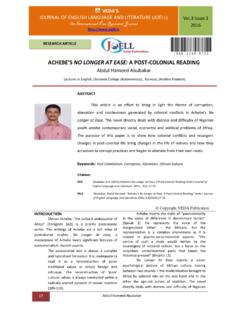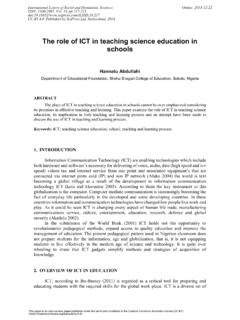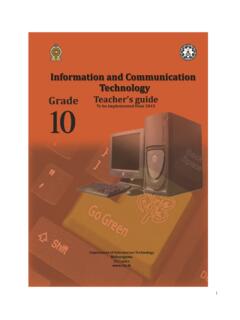Transcription of USE OF ICT IN ENGLISH LANGUAGE TEACHING AND …
1 34 Jayanthi 1, R. Vijay Kumar 2 VEDA S JOURNAL OF ENGLISH LANGUAGE AND LITERATURE (JOELL) An International Peer Reviewed Journal , 2, 2016 USE OF ICT IN ENGLISH LANGUAGE TEACHING AND LEARNING Jayanthi 1, R. Vijay Kumar 2 1(Lecturer in ENGLISH ,Andhra Loyola College,Vijayawada-500008) 2 (Lecturer in ENGLISH ,Andhra Loyola College,Vijayawada-500008) Jayanthi Kumar ABSTRACT Today science, information and technology (ICT) have left their impact on every aspect of human life. Most of the significant developments that one can observe today can be attributed to the impact of science and technology. As technology has created a change in all aspects of society, it is also changing our expectations of what students must learn in order to function in the new world.
2 Even in education sector, we witness that technological advancement and innovations have made a visible impact and have changed a scenario. The word ICT includes any communication device such as computer, mobile phones, radio, television, satellite system etc. Now the role and use of technology as a tool for TEACHING of ENGLISH LANGUAGE is increasing as educators have understood its ability to create both independent and collaborative learning environment in which students can learn ENGLISH with much ease. Traditional methods of imparting higher education have become less motivating. Here, technology plays an important role in creating innovation and motivation for the learners. This paper will address modern technology as Information and Communication Technologies, which has become possible in our communities since the availability of computers.
3 Keywords: ENGLISH LANGUAGE TEACHING and learning, ICT tools, ICT, Role of ICT, Science & technology. Copyright VEDA Publication 35 Jayanthi 1, R. Vijay Kumar 2 VEDA S JOURNAL OF ENGLISH LANGUAGE AND LITERATURE (JOELL) An International Peer Reviewed Journal INTRODUCTION The breakthrough of Information and Communication Technologies (ICTs) has utterly shaped our modern life. ICT is the term that is currently used worldwide to describe new technologies which depend mainly on computers nowadays. Even the traditional technologies such as radio, television and telephone are considered as ICTs. The United Nations Development Program me (UNDP, 2003) defines ICTs as: Basically information-handling tools- a varied set of goods, applications and services that are used to produce, store, process, distribute and exchange information.
4 They include the old' ICTs of radio, television and telephone, and the new ICTs of computers, satellite and wireless technology and the Internet. These different tools are now able to work together, and combine to form our `networked world' a massive infrastructure of interconnected telephone services, standardized computing hardware, the internet, radio and television, which reaches into every corner of the globe . THE POWER OF ENGLISH LANGUAGE We are TEACHING ENGLISH and learning ENGLISH , but why do we want to teach ENGLISH , in contrast with other foreign languages? The given answer is that ENGLISH is the most widespread LANGUAGE in the world. It is difficult to guess exactly how many ENGLISH speakers there are. However, according to estimation, there are more than 350,000,000 native ENGLISH speakers and more than 400,000,000 speakers of ENGLISH as a second LANGUAGE or foreign LANGUAGE .
5 ENGLISH LANGUAGE TEACHING (ELT) importance is in its steady progress via many means of modern communication technologies and inventions. Graddol (2000) states that in the year 2000 there were about a billion ENGLISH learners but in the year 2010 the number will be doubled. Moreover he indicates that over 80% of information which is loaded on the internet is the ENGLISH LANGUAGE . INFORMATION & COMMUNICATION TECHNOLOGIES IN ELT Nowadays, teachers of ENGLISH around the world prefer some form of communicative TEACHING and learning, rather than the traditional methods of ELT which dominate the teacher-centered approach and neglect the student communication skills. The teacher-centered approach depends mainly on the learner s memory and did not care about the authentic use of LANGUAGE . Although, a successful EFL teacher is not necessarily restricted to one method or another, the ICTs have changed the pace of TEACHING strategies to suit the goals of his materials and the needs of his students.
6 On the other hand ICTs have given the students, many opportunities to practice ENGLISH in and out the classroom. With the help of the modern technologies they have time and freedom to understand, reflect and analyze what have been exposed to. Moreover, the ICTs put forward an influential base for efficient education. Now, we need the modern technologies for a better blended method of delivery to create apt TEACHING techniques to enhance the process of learning ENGLISH LANGUAGE . ICTs are very motivating, because they help the learners to learn the LANGUAGE which is carefully designed to meet the prescribed goals. THE IMPACTS OF ICTS ON ELT No doubt, motivation is the cornerstone in the process of acquiring or learning a foreign LANGUAGE ; therefore, learners usually have a positive attitude toward computers.
7 Even though, the modern technologies are double-edged sword, their advantages are acknowledgeable over its pitfalls. No doubt, they have significant, positive impacts on ELT, the following are some them: of Materials ICTs are very stimulating because of the availability of the learning materials, whether it is computer-based, in the web or on CDs; therefore, the student can learn at his own pace with a very patient tutor (the machine). Meanwhile, the use of online telecommunications for TEACHING and learning via the computer in the classroom across the world will consolidate the improvement of different academic skills. The availability of images, animation, audio and video clips they help much more in presenting and practicing new LANGUAGE . 36 Jayanthi 1, R. Vijay Kumar 2 VEDA S JOURNAL OF ENGLISH LANGUAGE AND LITERATURE (JOELL) An International Peer Reviewed Journal B.
8 Student Attitudes ICTs have positive effects on student attitudes toward the LANGUAGE TEACHING and learning. Students felt more successful in school , were more motivated to learn and have increased self-confidence and self-esteem when using computer-based instruction. This was particularly true when the technology allowed learners to control their own learning. C. Autonomy Students have the opportunity to choose the element/s of LANGUAGE which they want to focus on meeting their learning strategies or learning styles. Here, the learner-centered approach is supported by these facilities offered by the ICTs while the tradition techniques approaches failed to give such opportunities. The student feels free to practice the LANGUAGE without fear from the others at their own phase and pace. D. Authenticity ICTs provide authentic learning environment, because the learner can interact with others across the continent are very motivating to the LANGUAGE learners.
9 Confronting such challengeable situations is the touchstone for using the LANGUAGE in authenticity not artificially. The ICTs as tools for learning are very motivational; however, they are very attractive and accessible. E. Help Teachers ICTs help the teacher to prepared, produce, store and retrieve their materials easily and swiftly. The availability of different rich texts, different topics, quizzes, exercises help in saving the teacher s time. Despite the opportunities and facilities offered by the modern technologies in assisting better TEACHING , but they do not replace it. So far, the skillful teacher is the only person who is shouldering the responsibility of delivering and achieving the TEACHING goals. F. Student-centered ICTs help the student be exposed to LANGUAGE clockwise and definitely they help them to write and edit their work in order to produce a well published work.
10 Likewise, computers encourage students to do extra work outside the classroom, play LANGUAGE games and, hopefully, gain extra exposure to the LANGUAGE and improve their progress in the LANGUAGE and support the student-centered concept. Via the computer and the internet the students will be able to communicate with others in different places. Moreover, ICTs help the shy or the quiet students who sometimes abstain from asking questions or challenging information to communicate and ask questions. Using modern technologies in the learning environment has been shown to make learning more student-centered and improve the learning process by stimulating teacher/student interaction. Furthermore, ICTs enhance collaborative learning which results in higher self-esteem and student achievement.





